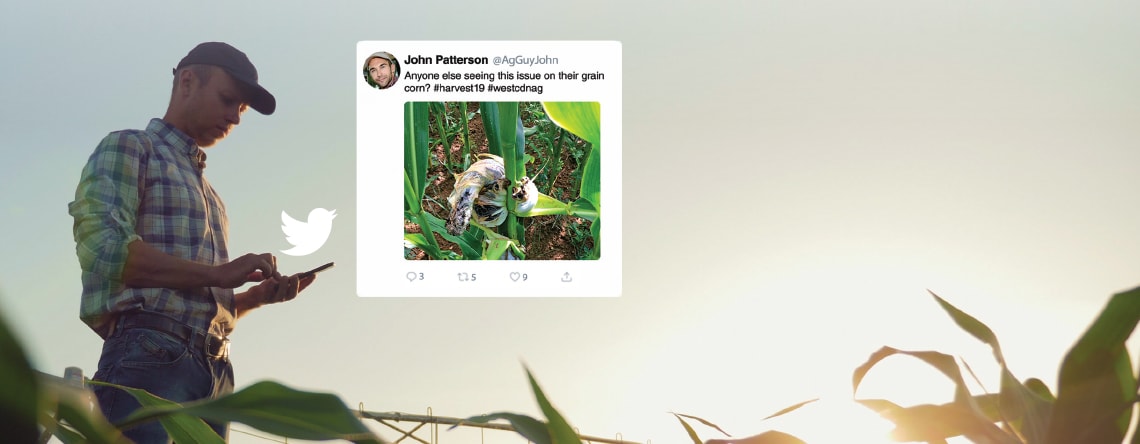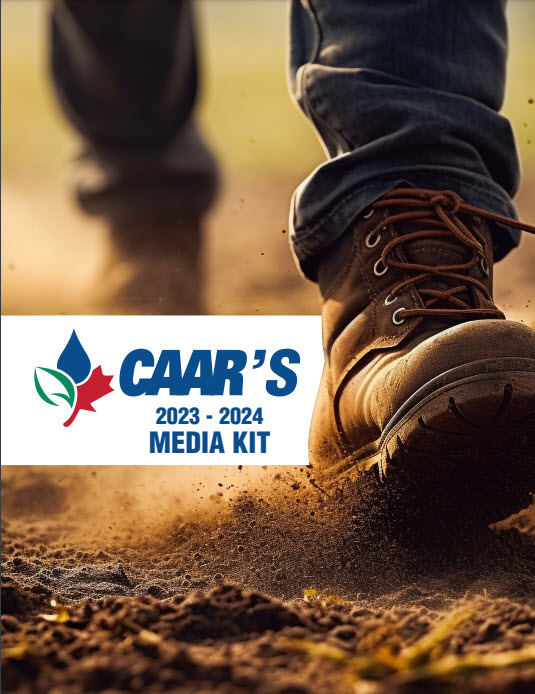Digital connectedness is changing the agronomic conversation.
Prairie Certified Crop Adviser (PCCA) Board chair Kelly Boles says Canadian farmers are increasingly turning to Twitter with queries on many different aspects of crop production, from insect identification to grain drying.
“I’ve been on Twitter for about five years, both personally and with my agronomy business,” says Boles who owns Alberta-based agronomic consulting company Center Field Solutions Ltd. “I see some of my clients locally, say they have a question about grain drying, they’ll put it out on Twitter. They won’t phone the grain drying company. They’ll just put it out there to see who responds.”
Boles says this example is part of a larger change to the way CCAs have traditionally interacted with customers since social media use has become the social norm. He sees this new way of communication as positive overall, saying Twitter is also creating new opportunities for all levels of the industry to connect.
Professional Development
“Twitter creates real-time opportunities to connect and share information among farmers, agronomists and the broader industry,” Boles says. “All levels of agriculture are participating to an extent, and you can start and be a part of so many valuable discussions.”
Amanda Smith is a sales agronomist with Horizon Fertilizers in Bruno, Sask. Horizon is an independent retailer with four locations across Saskatchewan. Smith says she sees the most value in social media for professional development and collaboration with fellow agri-business professionals.
“It’s such a good place to learn things and pick up so much knowledge from others. That’s why I use Twitter,” says Smith. “It’s a good way to keep up with the agri-business community, for example with conferences. Even if you can’t attend a conference, you can pick up bits and pieces by watching the hashtag and seeing what others are posting.”
CCAs need to see some value returned to them, they can’t give it all away on Twitter for nothing.
Boles says CCAs can view participation in these conversations as building a personal brand, showcasing their areas of interest and specialization to current and potential customers. Sometimes this may involve giving advice directly over Twitter.
For example, Smith says the questions she sees on Twitter from farmers most frequently involve weed and insect identification. It may be quick and easy to jump in and give an answer to these specific questions, but Boles says it can be best to keep responses at a surface level, leaving in-depth responses to more detailed questions for a formal customer meeting.
“I think an encouraged use pattern on Twitter right now is to talk using some generalizations,” says Boles. “CCAs need to see some value returned to them, they can’t give it all away on Twitter for nothing.”
New Ways to Monetize
Boles points to one new development that allows experts to provide farmers with information in a real-time, digital format, while also monetizing their advice and services, a new app called AGvisorPRO which launched at Ag in Motion in the summer of 2019.
AGvisorPRO brands itself as the “Uberization” of agricultural knowledge and wisdom, using an algorithm to connect farmers with questions to experts with answers. The app’s network of “AGvisors” has two categories, either independent experts or company representatives.
The app is free to download, but co-CEO Patrick Walther says monetization occurs when users are ready to start a conversation. Walther says farmers pay a rate of about $30 to $60 for 10-minute conversation increments with independent advisors.
“AGvisorPRO is a convenient way of monetizing knowledge and wisdom,” says Walther. “So far that has been quite a challenge for some experts.”
Walther says it is free to connect with corporate representatives, because those conversations may come with a sales pitch and AGvisorPRO promotes their app to industry as a way to generate new customer leads.
“We wanted to make sure that we weren’t excluding the industry. We have corporate clients like seed companies and equipment companies,” he says. “When a farmer is making up his mind on a decision, he may be consulting many different levels of the industry.”
At the time of writing, no ag retail businesses were involved with AGvisorPRO, but Walther says they are in conversations with retailers. At the end of 2019, over 130 AGvisors were on board.
Walther says AGvisorPRO requires experts to provide credentials like education, professional designation and years of experience through their in-app biography. However, he says a key disclaimer is that all advice is just that – advice. Users are responsible for their own decisions.
Acting Ethically
Boles agrees it is up to the user to decide for themselves what advice or information is credible, no matter the platform. That said, he says the PCCA Board, other boards and industry do their part to make sure advice circulating on social media is reputable.
“As a professional designation, we have to be competent and abide by a code of ethics,” Boles says. “We have to exercise some caution because there is liability that if you go too far out of your expertise or if you if you state something that is incorrect, it may be subject to a review by our standards and ethics committee.”
As an Articling Agrologist (A.Ag) in the final stages of achieving her P.Ag, Smith says she takes the ethical standards of the designation seriously on social media. She says if a P.Ag sees inaccurate advice circulating in a discussion thread, the response is either clear cut or a little murkier, depending on who is giving the advice.
“We have the ethical duty to call out and report agrology that is unethical or incompetent. So reporting social media content is within the scope of what we are supposed to do,” says Smith.
“But if the person sharing the questionable advice is not a P.Ag, it’s kind of murky waters,” she continues.
“I like to think I would be comfortable calling out bad advice, but it honestly comes down to how knowledgeable I am on that specific topic.”
Be sure to use the hashtag #CAARcon2020 during the CAAR Conference from Feb. 11-13 to share snippets from speaker sessions and conference events.
Related Articles
- Do you need to boost your online presence? The Canada Digital Adoption Program (CDAP) was established to help small and medium sized enterprises (SME) boost their online presence and digitize how they run their businesses behind the scenes. If you are a sm...
- Get to know fellow CAAR Retailers “Rosenort Agro has been a member of CAAR since pretty well the beginning of CAAR,” says Denis Benjamin, General Manager, Rosenort Agro. Rosenort Agro was started by Levi Brandt in the late 1940s as a fuel and oil com...
- Building Digital Efficiencies If you had a dollar for every time you’ve heard the word “disruption” in regard to Canadian ag retail in the past three years, how much richer would you be? In recent years, Canadian ag retail has experienced sign...
- Reviewing Results Delegates attending the 2020 CAAR Conference had the opportunity to get a first-hand look at the results from the 2019 Canadian Precision Agriculture Dealership Survey, conducted by the University of Guelph, with inp...
- Reflecting on The agrē Solution In the final part of our five-part series on The agrē Solution, Blair’s Family of Companies looks back on their experience with The agrē Solution. With the arrival of fall, harvest is just around the corner. As th...
 How to resolve AdBlock issue?
How to resolve AdBlock issue? 


Join the discussion...
You must be logged in as a CAAR member to comment.
Report
My comments